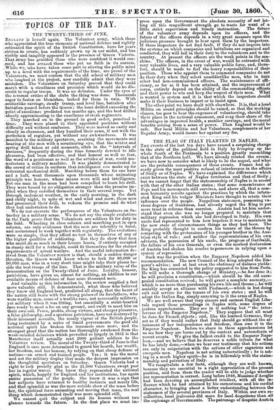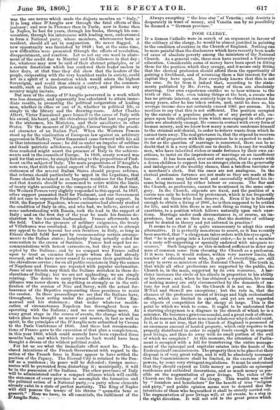THE FLAG OF ITALY PLANTED IN NAPLES.
Tux events of the last ten days have caused a surprising change in the state of the political field in 'Italy by bringing ill) the whole South, of the Peninsula to a position greatly resembling that of the Northern half. We have already related the events ; we have now to consider what is likely to be the sequel, and what are the probable consequences of those events. France had al- ready given the most positive refusal of interference in the affairs of Sicily or of Naples. We have explained the differences which exist between the state. of Naples territories and that of Sicily • but we cannot forget that the statesmanship of Naples is in aocorci with that of the other Italian states ; that some remembrance of Pepe and his movements still survives, and above all, that a com- mon humanity revolts against the practices by which the infatu- ated King and his vulgar Ministers have thought to retain their influence over the people. Neapolitan statesmen, possessing va- rious degrees of frankness, had already urged the King to put more trust in reforms than coercion. Austria bad let him under stand that even she was no longer prepared to maintain that military repression which she had developed in Italy. His own uncle had represented to him how hopeless it was to maintain in the new state of circumstances things as they had been. The King probably thought to confirm his tenure of -the throne by competing with the pretensions, of his younger brother in the Aus- trian style of rule ; and neither the representations of his own advisers, the persuasion of his uncle, the progress of Garibaldi, the failure of his own Generals, or even the marked deolaration of Austria had shaken his resolve to persevere in relying upon a system of repression. Such was the position when the Emperor Napoleon added his recommendation. The new Council of the King adopted the Em- peror's advice ; and at last even the obstinacy of dulness yields : the King has consented to the policy suggested to him from Paris. He will make a thorough change of Ministry,—he has done it; he will proclaim a constitution,—which should be the old mire- pealed constitution revived ; he will grant a complete amnesty,— which is no more than purchasing his own life and throne;. he will amiably accept an alliance with Piedmont, which is but doing suit and service for the tenure of his own states ; and he will adopt the Italian flag, simply annexing to it the arms of Naples. . We are well aware that very sincere and earnest English Libe- rals regard these proceedings in Naples with some degree of jealous apprehension. They see in it nothing but " the inter- ference of the Emperor Napoleon." They suppose that all must be done for French objects ; and, like the learned Germans, they act as if they would rather that Italy should go without, the at- tainment of her independence and freedom, than owe it to the Emperor Napoleon. Before we share in these apprehensions let us see how they are borne out by the context and antecedents of recent events. We give the fullest credit to ,the Emperor we believe that he deserves a noble tribute for what
he has lately done,—when we bear our testimony that his actions are only in cooperation with the actions of other sagacious and energetic men. Napoleon is not acting autocratically ; he is act- ing in a much higher spirit—he is in fellowship with the states- manship and patriotism of Italy. ,
We recapitulate a few facts, although they are well known, because they are essential to a right appreciation of the present position, and from them the reader will be able to judge whether our representation is correct. Long before 1848, Massimo d'Azeglio had been devoting an accomplished intellect, with all the in- fluence which he had attained by his earnestness and his cordial character, to bringing about a better understanding between the statesmen of the .several provinces of Italy. Within our own re- collection, local-jealousies did more for kcal despotisms than all the espionage of Governments. The patronage of despotic Austria -was the one nexus which made the disjeeta membra an " Italy." It is long, since D'Azeglio saw through the fatal effects of this jealousy; -and-now in Florence then-in Turin, now in Rome then -in Naples, he had for yeate, through his books, through his con- versation; through-his intercourse with leading men, endeavoured to form a National party, -whose members, wheresoever born or resident, should all -act in conjunction. He never flagged. A -new opportunity was furnished 'by 1848 ; but, at the same time, new difficulties were Presented through the effects of revolution, -disappointment, and reaction. Let us not say one word in abate- ment Of the credit dye to Mazzini and his followers in that day ; for, whatever May now be-said of their abstract principles„ or of 'a certain fanaticism which has rendered their leader useless in later days, at that time they' did shew that the leaders of the People; cooperating with the very humbleat ranks in society, could act in a spirit of, a moderation which would adorn the highest SoVereigns, and could thus obtain a control over the common- wealth, ,such as Italian princes night envy, and princes iii any
countrythight imitate. . •
But men of the stamp of D'Azeglio nersevered in a work which was less dramatic, and apparently less calcalated to attain imme- diate rearifte, in promoting. -the 'political 'cooperation of leading -then 'whether in office or' out -of it, whether in political life, or simply in 'the libiary and the drawing-room. After Charles Albett, .Victor Emmanuel gave hiniself to the cause' of Italy with his sword, his heart, and the chivalrous faith that lent regal power to the statesmen, his Ministers, and their auxiliaries in other States: To the measure of D'Azeglio Cavour brought the practi- cal character of an Italian Peel. When the. Western Powers stood. tip for the vindication of European law against an arbitrary aggrernon hi Turkey, Victor Emmanuel came forward with his aid • iii thatieteisthitional cause; 'redid so under an impulse Of sublime and frank -patriotic selfishness, avowedly hoping that the service thus rendered' might .assert the presenee of Italy in the achieve- ments and in the councils of Europe:. In 1856; scanty reward was 'paid for that- sei vice, 'by simply listening to the propositions of Pied- -Mont on the subject of Italy. -The main propositions of D'Azeglio's :note were, that with the moral support of the Western Powers, the {statesmen 'of this several Italian -Stites should propose reforms, that reforms should particularly be 'urged' in' the Legations, that Rome should be retained as an Imperial -residence for the Pontiff, and that Austria should be sumraotted: to retire within the limits of treaty rights according to the compacts of 1815. At that time, -the Western Powers very slightly'responded to this appeal. In 1857, ssther support presented itself for Piedreont, and our Government did not care to supersede Piedmont'S reliance on'tbat support. In 1859, the Emperor Napoleon, whose emissaries had already studied the condition of Italy in situ, and who had, we believe, arrived at -some understanding with Russia; took the lead in the support of, Italy ; 'and on the first day of the year he made his famous de 'elevation to the France afterwards took the field: Under the pressure of military exigencies, the treaty of Tillafratica was concluded. It pledged Austria not to attempt any appeal to force beyond her own frontiers in Italy, so long as Fiance should fulfil' her part by recommending certain arrange- nients.to the Italian states ; -Lombardy being actually ceded for -annexation to. the crown of Sardinia: France had urged her re- commendations 'with honest • earnestness, but they were not ac- cepted by the Italians ; and by no compact was France called upon to• treat as enemies 'that people- whom she had already rescued; and who have never ceased to express their gratitude for the chivalrous service s for on all nubile occasions in Italy the names of'Napoleon and 'France -are repeated with popular acclamation. Some of our friends may think the Italians mistaken in these de- clarations offeeling ; but tine - are not applauding, we are simply relating.' The desire to carry forward the effects of the French 'alliance was never shown in anything so strongly as in the rati- ileation of the cession. of Nice and Savoy, with the actual for- hearanee of the Deputies' repreSenting those provinces to resist the cession. In these proceedings' we see that the Italians have, throughout, been acting under the guidance of Victor Em- manuel and his statesmen ; that under whatever - modifi- cation of 'circumstances Napoleon. has throughout been co- operating with the Italians ; and we see something more. At every great stage in the course of events, the change which has taken place has brought us nearer and nearer, in fact as well as 'spirit; to the principles of the D'Azeglio note submitted by Cavour to the Paris Conference of 185G. And these last recommenda- tions of France gave to the execution of that plan a completeness, in this year 1860; which could scarcely have been expected three months baek; and which twelve 'months back would have been thought a dream. of the wildest political zealot.
For let us see what 'the immediate effect must be. The de- clared intentions of the French Government with regard to the action of the-French force in Rome appear to have settled the position of the Papacy. The Eternal City- is retained to the Pon- tiff as' a' residence ; its peace will he defended ; foreign merce- naries:will be prevented from,disturhing it ; municipally, it will be in the possession of the -Italians. -The other provinces of Italy will be administered- under a compact alliance which will enable the statesmen of every province to accomplish the formation and the politieal action of -a National party,—a party whose elements already exist in a- state of peifect Maturity. The Ring of Naples will still possess the tenure of his thione " quanichu bone se mserit." Here we have, in all' essentials, the fulfilment of the D'Aseglio Note. Always excepting " the lone star "of Venetia ; only Austria is desperately in want of money, and Venetia can by no possibility be deemed a " German province."



























 Previous page
Previous page